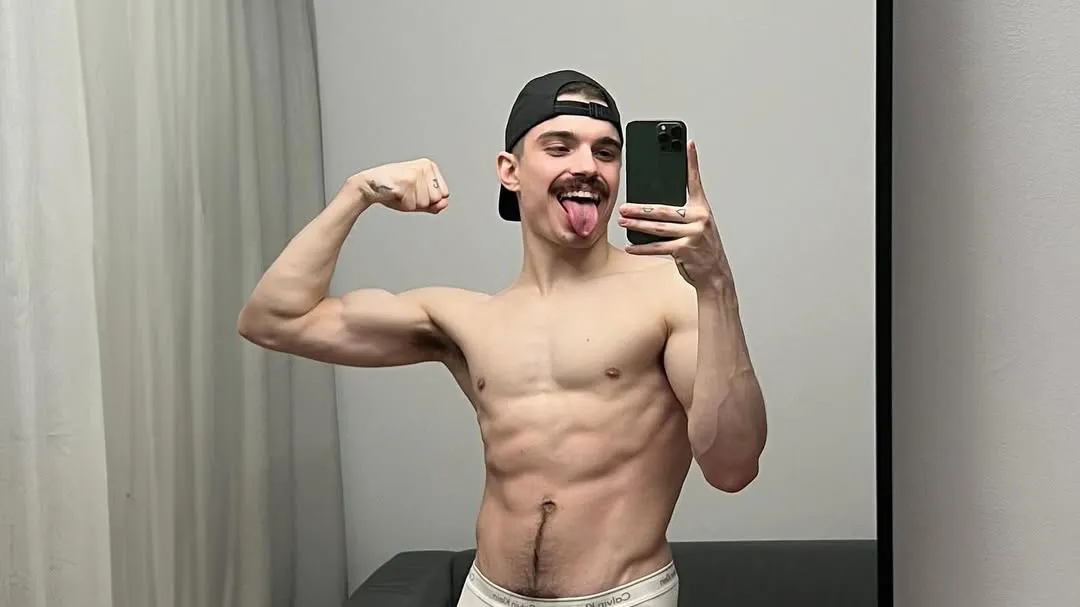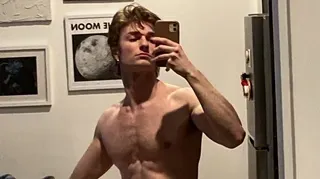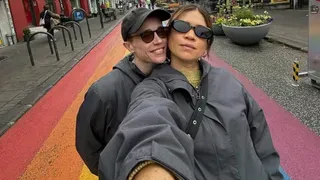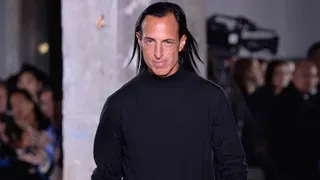
May 10
Todd Flaherty Continues his Journey with 'Angels in America' in Provincetown
Kilian Melloy READ TIME: 7 MIN.
Provincetown resident and filmmaker Todd Flaherty starred as Prior Walter – a gay Mormon struggling with his HIV+ status – last summer in The Provincetown Theater's production of "Angels In America, Part I – Millennium Approaches." Flaherty returns to the role as the company mounts Part II of Tony Kushner's epic 1991 play, subtitled "Perestroika." (The play runs May 8-25; for tickets and more information, visit provincetowntheater.org.)
The author of his own popular queer works – including the highly acclaimed "Chrissy Judy," about a friendship between two queer men that Flaherty wrote, directed, and starred in – the actor is a distinctive creative voice for the LGTBQ+ community. His stage work for The Provincetown Theater hasn't been his only chance at a hometown gig; he featured in last year's film festival darling "High Tide," which Italian filmmaker Marco Calvani shot while on a COVID-era extended stay in the queer mecca. Not unlike the main character of that film – played by Calvani's husband, actor, Marco Pigossi – Flaherty, a New Jersey native and New York transplant for a number of years, came to Provincetown expecting it to be a short stay, only to find his time there extending to a more permanent situation. "I was supposed to be here for 10 weeks, and I haven't left yet," Flaherty laughs.
"Angels in America," for those unfamiliar, recounts the complicated (and sometimes supernatural) relationships between several gay men at the height of the AIDS epidemic. Set in a time before proven drug regimens and PrEP, and incorporating the historical figure of closeted Trump mentor and gay persecutor Roy Cohn, the play has renewed force in an age when campaigns to eradicate HIV and uphold equality for queer people and other marginalized minorities are under serious threat. Flaherty offered his thoughts on the play, his own personal and artistic journey, and why this summer's production of "Angels in America," Part II, feels more urgent than last year's "Part I."
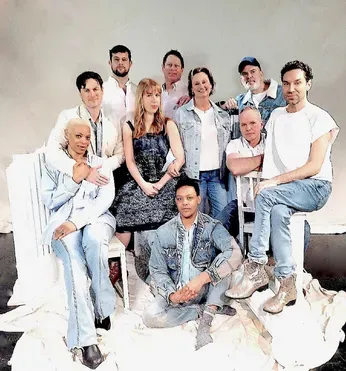
EDGE: Was it hard to come back to "Angels in America" a year after doing Part I, when the world has changed so much since last summer?
Todd Flaherty: Last year, it felt so exciting because there was so much in the air politically, and it felt like we were moving away from Trump-era nonsense. And this year just feels so different, but the message feels even clearer and stronger. It felt important to do the show last year in this community, and it feels extra important to do it this year.
EDGE: Has your interpretation of Prior Walter changed?
Todd Flaherty: Prior really goes on such a huge spiritual journey in Part II, and I feel particularly connected to that, especially in the wake of so much uncertainty. What he discovers is that we as humans have agency in our lives to affect change; when he's given the chance to end his illness and go to Heaven, he decides to go back to the Earth and live with his illness in order to experience life, even if it's imperfect. I don't know that my interpretation of him has changed so much in terms of like characteristics, but I think that I have a deeper appreciation for the ability to play him right now.
EDGE: Prior is a complicated character. What is your backstory for him, or your mental index card for what drives him?
Todd Flaherty: I love this character so deeply. I don't think I've ever fully understood Prior so wholly as I do now that I'm in my 30s and I understand what makes a person develop into having the personality traits that Prior has. He's fiercely intelligent. He is someone who has to figure out how to maneuver through a world that doesn't necessarily accept him. He's constantly letting his guard down in order to let other people in, and I think that it's a challenge for him because he's probably spent the majority of his life putting up those guards.
I think that he's looking for validation, and I think he's driven by the fact that the time is ticking. He's watching a bunch of other people around him die. I don't think Prior has ever lived as a person who [can pass for straight], which is why he's in New York and a cater waiter and an occasional drag queen. He's not someone who anyone has ever questioned whether or not he's straight.
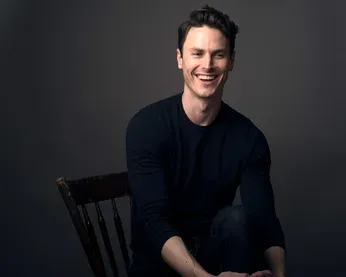
EDGE: On the subject of drag queens – in "Chrissy Judy," you portray Judy, a drag queen. How do you wrap your mind around what is happening in terms of drag being so enthusiastically embraced by such a big audience, but also so viciously attacked by so many lawmakers?
Todd Flaherty: Personally, it's an extension of my creativity. I never did drag before I did "Chrissy Judy." I sort of stumbled into it because I was trying to write about what it means to be a queer performer, and I didn't want to write about an actor. I was like, "Wouldn't it be interesting if these two characters were both drag queens? That is such a queer art form." In writing it, and knowing that I wanted to play the part, I started doing drag, and I fell in love with it. I would watch old movies and always be connected to the female characters, and so drag was an opportunity for me to kind of live in their world.
That's why I do it, but I know other people who do try to express gender differently, and I think ultimately why we, as queer people, love it is because it allows people to put on some sort of layer, whether that's makeup, wig, jewels, whatever, and express themselves without fear of being seen. It's a very unique experience walking around and feeling like you're being seen as a totally different person than who you are out of drag. I think conservatives latch onto it for quite a different reason: I think that, subconsciously, it shows people how performative femininity is. In our patriarchal society, where we place women as mothers, caregivers, housekeepers who wear lipstick and makeup, when men start to take that on it is an affront to what we ask women to do. It forces us to realize that not only is femininity performative, but gender is performative. I think that that's a difficult concept for people to grasp, and it goes against so much of people's upbringing, and I think that that's why there's such a huge pushback.
EDGE: You created and starred in the web series "Undetectable," which seems like it could have a thematic connection with "Angels in America."
Todd Flaherty: That's probably 10 years old at this point, so it's not something that I think back on too much, but it was the first thing that I had ever written to perform in. I am not HIV+, so I never like to suggest that I'm a spokesperson for that experience. But I had a mentor who said, "If you want to write something good, you should write about the thing that scares you the most." And I, in my early 20s, had four friends who seroconverted, and this was before PrEP. There was so much shame and stigma around it that I wanted to explore what it meant to be living with HIV. It is so different from what is being explored in "Angels in America," but the heart of what is there is shame, and I think what Prior carries around with him is the shame of being sick, and the shame of dying, and the shame of needing someone to walk that experience with you.
EDGE: As an artist, and as a gay man, what does "Angels in America" mean to you?
Todd Flaherty: The play was such a pivotal moment for the queer community in terms of representation and telling deeply profound and personal stories about our community. I'm not religious, but I am definitely spiritual in some way, and I think that opportunities present themselves to do work and you're drawn to it, or you're not drawn to it. I instantly said yes to doing this play; the second I got into the rehearsal room, I was like, "I need to be doing this play right now," because, really, what Part II is about is our agency as people to create the life that we want to have, and to see the world that we want to see. I'm excited to share that with the community at large here in Provincetown, because I think that these are scary times, and I hope that people walk away feeling a sense of agency in their own life. Even the face of darkness, we are the source of our light.
"Angels in America Part II: Perestroika" opens Provincetown Theater's 62nd season, running May 8-25 at 238 Bradford Street in Provincetown, MA 02657. For tickets and more information, visit provincetowntheater.org.
Kilian Melloy serves as EDGE Media Network's Associate Arts Editor and Staff Contributor. His professional memberships include the National Lesbian & Gay Journalists Association, the Boston Online Film Critics Association, The Gay and Lesbian Entertainment Critics Association, and the Boston Theater Critics Association's Elliot Norton Awards Committee.
